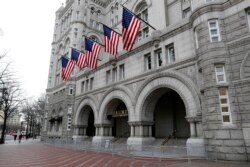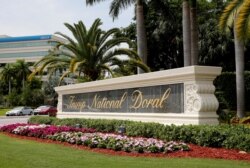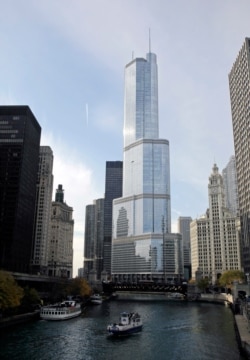U.S. President Donald Trump is raising money for his re-election campaign at a record pace, with hundreds of millions of dollars already in the bank. But his massive haul is again focusing attention on his practice of holding fundraising events at his own properties.
Trump, who declared his 2020 re-election bid the day he took office, attended a joint fundraiser for himself and House Republicans on Tuesday evening at the Trump International Hotel in Washington. The gathering reportedly raised $13 million for a committee that supports Republicans in upcoming congressional elections.
The event, held just blocks from the White House, was the second one this week. The president reportedly raked in millions of dollars from a fundraiser in Chicago at Trump International Hotel and Tower on Monday.
These events are part of Trump's highly effective fundraising strategy, which has raised more money than that of any other sitting president in history by this point in the campaign. In the third quarter of 2019 alone, the Trump 2020 campaign and the Republican National Committee said they had raised $125 million, with $158 million combined cash on hand.
The president defends hosting the events at his properties, saying he retains financial ownership of the hotels but does not run any part of his real estate business. But some of his critics argue this approach helps line the pockets of Trump's enterprises.
“It’s the perfect cycle of corruption,” said Robert Weissman, president of Public Citizen, a public interest advocacy group. “Trump raises money from super-rich donors for himself or for Republican candidates or party committees, then takes a cut of the money for himself, personally, via payments to his hotels."
Several lawsuits
The Trump hotel in Washington is the subject of a number of lawsuits arguing that the president’s ownership of the property violates the Constitution's emoluments clause. The provision generally prohibits federal officeholders from receiving any gift, payment or other thing of value from a foreign state or its rulers, officers or representatives. The law was designed to shield officeholders against corrupting foreign influences.
Trump has repeatedly denied that he is using the presidency to promote his resorts. “I have a lot of hotels all over the place, and people, they use them because they’re the best,” he told reporters in September.
Still, political events held at a venue that bears the Trump name demonstrates the president's willingness to intermingle his political activities with his financial and business activities, said Rudy Mehrbani, senior counsel at the Brennan Center for Justice, one of several organizations advocating for the codification of the emoluments clause and extension of the conflict-of-interest laws to future presidents and vice presidents.
“The president is leveraging the office of the presidency to benefit himself and his family's organization,” Mehrbani said, citing examples including Vice President Mike Pence’s official September trip to Ireland, where he stayed at a Trump resort despite its being hundreds of miles away from the venue of his official business, and the administration’s choice of Doral, a Trump resort in Miami, as the location for the next Group of Seven summit for the leaders of the world’s seven most advanced democracies.
The G-7 plan – which would have brought international attention and publicity to the financially struggling Trump National Doral Miami – was abandoned days after the initial announcement following criticism from both Democrats and Republicans. White House acting chief of staff Mick Mulvaney insisted that the event would have been done “at cost,” but that did little to appease critics.
In a Fox News interview, Mulvaney defended the choice and said the president “still considers himself to be in the hospitality business, and he saw an opportunity to take the biggest leaders from around the world and he wanted to put on the absolute best show, the best visit that he possibly could.”
Yet Weissman said the selection of Doral was intended to show the president’s “utter disdain for constitutional requirements.”
“While our laws should be tightened, the problem is much less the law than it is Trump,” Weissman said. “Trump has no concern about the appearance or reality of impropriety, nor even respecting the Constitution.”
The Doral appointment was also defended by conservative columnist David Marcus, who wrote, “Just like holiday home field advantage, this situation will help the president and the country.”
Neither the White House nor the Trump campaign responded to VOA’s request for comment for this story.
For sale
The Trump Organization announced last week that it was exploring selling leasing rights to the Washington hotel, in part because of ethics concerns related to the president’s profiting from the business.
“People are objecting to us making so much money on the hotel, and therefore we may be willing to sell,” Eric Trump, one of the president's sons, told The Wall Street Journal, which first reported the sale. The newspaper also reported that the Trump Organization aimed to obtain more than $500 million from the sale.
The hotel is in the historic Old Post Office Pavilion, five blocks down Pennsylvania Avenue from the White House. The Trump Organization began leasing the rights from the federal government’s General Services Administration (GSA), the agency that owns the building, before the president was inaugurated in January 2017, and spent more than $200 million to open the hotel.
If the company goes through with a sale, the transaction may mean removal of the president’s name from the property. But Mehrbani sees it as too little, too late, and says it may create another emoluments clause issue as the GSA, a federal agency led by a Trump political appointee, will be one of the parties involved in the transaction.
“There is no firewall right now between the White House and the General Services Administration,” Mehrbani said, adding it could raise questions about “potential self-dealings.”
Shannon Bow O’Brien, who teaches presidential studies at the University of Texas at Austin, said there’s a potential problem other than the appearance of dealing on “both sides of the sale.” The buyer could raise more concerns, she said, particularly if it is “a corporation with a large international presence.”
“President Trump did not divest prior to taking office and it has caused a tremendous amount of concern and conflicts of interest,” O’Brien said.
Subpoena for GSA
Last week, the House Committee on Transportation and Infrastructure subpoenaed the General Services Administration, seeking documents about its hotel business arrangement with the Trump Organization.
"The American people have a right to know whether the president of the United States, who is serving as both the landlord and tenant of the Old Post Office Building, is violating the emoluments clauses of the U.S. Constitution to enrich himself," Committee Chairman Pete DeFazio, a Democrat from Oregon, said in a statement.
Mehrbani, of the Brennan Center for Justice, added, "Whatever Congress decides from those documents, it’s clear that the American people can't count on the GSA, particularly under the Trump administration, to ensure that federal ethics rules and the intentions behind those rules are followed when determining how the lease should be governed."
While Democrats have complained about the financial arrangement that allows foreigners and companies with business before the U.S. government to curry favor with Trump by staying at his properties, none of their legal challenges have resulted in action against the president.
That could change with the House of Representatives scheduled to vote Thursday on a resolution to formalize procedures governing the next phase of the impeachment inquiry into the president's alleged wrongdoing.
'Frustrating'
Whether opposition Democrats succeed in making the emoluments clause a part of the impeachment inquiry, some analysts say Trump's continuing association with his company could damage his reputation with the public in a way it did not in 2016.
O'Brien of the University of Texas said the president's continuing intermingling of business and politics and the controversy over his request to Ukraine's leader to investigate a political rival are "frustrating people."
“It's making them feel like he's trying to behave like an imperial president or behave like a king or an absolute monarch who is not accountable to the people who elected him,” she said. “I think that's working against him right now."
O’Brien also warned, however, that the impeachment process could end up working in the president's political favor, by becoming a “badge of honor.”
“He is going to probably try to cast himself in the anti-hero role, as an anti-hero president,” she said.






